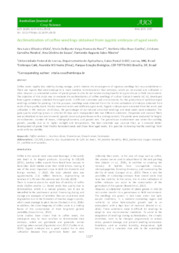Acclimatization of coffee seedlings obtained from zygotic embryos of aged seeds.
Acclimatization of coffee seedlings obtained from zygotic embryos of aged seeds.
Autoria: VILELA, A. L. O.; ROSA, S. D. V. F. da; COELHO, S. V. B.; PEREIRA, C. C.; SOUZA, A. C. de; RIBEIRO, F. A. S.
Resumo: Coffee seeds rapidly lose viability during storage, which hinders the development of vigorous seedlings for crop establishment. There are reports that seed endosperm is more sensitive to deterioration than embryos, which can be excised and cultivated in vitro. However, a substantial number of plants grown in vitro do not survive during transfer to a greenhouse or field environment. The objective of this study was to evaluate the acclimatization of coffee seedlings of cultivar Catuaí Amarelo IAC 62, developed from zygotic embryos obtained from aged seeds in different substrates and environments, for the production of well-developed seedlings suitable for planting. For this purpose, seedlings were obtained from the in vitro cultivation of embryos obtained from seeds of two quality levels: freshly harvested seeds and artificially aged seeds. Zygotic embryos were extracted from the seeds and cultivated in MS medium. At 60 days, the percentages of normal and abnormal seedlings and dead seeds were evaluated. The good-quality seedlings grown in vitro for 60 days were transplanted into two different substrates (Tropstrato and coconut fiber) and acclimatized in two environments (growth room and greenhouse with a misting system). The plants were evaluated for height, stem diameter, number of leaves, chlorophyll content, and growth rate. The greenhouse environment was better for seedling growth, possibly due to its higher sunlight and temperature. The best substrate was coconut fiber, as it ensured better development of plants from freshly harvested seeds and those from aged seeds. It is possible to develop healthy seedlings from seeds with low viability.
Ano de publicação: 2022
Tipo de publicação: Artigo de periódico
Unidade: Embrapa Café
Palavras-chave: Coffea arabica var. arabica, Enzyme substrates, Greenhouses, In vitro culture, Seedlings, Seeds, Zygotic embryos
Observações
1 - Por padrão são exibidas publicações dos últimos 20 anos. Para encontrar publicações mais antigas, configure o filtro ano de publicação, colocando o ano a partir do qual você deseja encontrar publicações. O filtro está na coluna da esquerda na busca acima.
2 - Para ler algumas publicações da Embrapa (apenas as que estão em formato ePub), é necessário ter, no celular ou computador, um desses softwares gratuitos. Sistemas Android: Google Play Livros; IOS: iBooks; Windows e Linux: software Calibre.
Acesse outras publicações
Acesse a Base de Dados da Pesquisa Agropecuária (BDPA) para consultar o acervo completo das bibliotecas da Embrapa.

